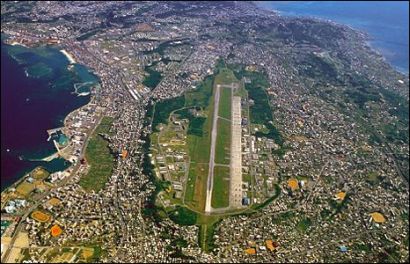
Memorial Tower for the Reversion of Okinawa, dedicated on
May 15, 1972, when the United States returned Okinawa to
Japanese sovereignty – in a manner of speaking. It reads,
'Memorial Marking the Struggle to Return to the Homeland.'
Okinawa
Deserves Long-Sought Freedom from American Bases (Tokushima Shimbun,
Japan)
“U.S. base closures haven't proceeded as quickly as on the mainland, and Okinawa remains encumbered with 74 percent of U.S. military facilities in Japan. ... The reason Okinawa demanded a return to Japanese sovereignty was to achieve greater economic independence and life without bases. Hopefully now, the prefecture will be permitted to move closer to these goals, however fitfully.”
EDITORIAL
Translated By Violet
Knight
May 16, 2012
Japan - Tokushima Shimbun – Editorial Page (Japanese)
Residents of Okinawa suffered vast casualties during the
Pacific War, and the island was subsequently occupied by U.S. forces for a very
long time. The movement calling for Okinawa’s return to
Japanese rule finally bore fruit on May 15, 1972.
However, U.S. base closures haven't proceeded as
quickly as on the mainland, and Okinawa remains encumbered with 74
percent of U.S.
military facilities in Japan.
Efforts to invigorate the local economy have produced few
notable results, and the struggle to achieve economic independence goes on.
The situation in Okinawa reflects Tokyo’s decision to concentrate
the lion’s share of the burden of the U.S.-Japan alliance onto a tiny island. With
the 40-year milestone upon us, we should pause and consider the origins of Okinawa’s
return [to Japanese sovereignty].
Today of course, the big issue when it comes to recovering
territory used for U.S. bases is of course the Futenma
Air Station in Ginowan city.
Posted by Worldmeets.US
The governments of Japan and the United States had agreed to
relocate the base to the Henoko district of Nago city, but a joint statement released last month suggested
that other areas are being considered as well.
Given the reemergence of strong Okinawan
opposition to relocating Futenma to Henoko, the idea of integrating forces at Futenma with those at the Kadena
Air Base has resurfaced. The joint statement has added to the confusion. Whatever
the case - permitting the Futenma Air Base,
considered one of the most dangerous in the world, to become a permanent
fixture, must be avoided at all costs.

The
Futenma Marine Air Base in Okinawa: The almost legendary
aggravation
of Okinawa residents with the noise of the base and
the
disruption caused by the Marines that inhabit it is creating
big
headaches for Japan's new government.
SEE ALSO ON THIS:
The Okinawa Times, Japan:
It's Time to End Japan's 'Servitude to America'
Nishinippon Shimbun, Japan:
It's Imperative for Japan to Look Outward Again
Nishinippon Shimbun, Japan:
Revise ‘Inequitous’ U.S.-Japan Security Deal
Ryukyu Shimpo Shimbun, Japan:
After Quake, Japan Can Ill Afford U.S. Base Repair
People's Daily, China:
Australia Should Avoid Helping U.S. Hurt China's Interests
Australia:
Aussie Coverage of Obama's Visit to Darwin; His Challenge to China
Isen Shimbun, Japan:
Despite its Mistakes, Japan Needs U.S. More than Ever
The Hankyoreh, South Korea:
Talk of Renewed North Korea-China Alliance
Huanqui, China:
America Stirs Anti-China Fears in South China Sea
Mainichi Shimbun:
China 'Mustn't Be Permitted' to Push Around its Neighbors
People's Daily, China:
Clinton's 'Insults' Violate China's Human Rights
People's Daily, China:
U.S. Internet Hypocrisy Creates Global Suspicion
Huanqui, China:
U.S.-Listed Chinese Firms are Ruining China's Reputation
Huanqui, China:
Blunt Talk Reflects Improved Sino-U.S. Military Relations
Okinawa Prefecture Governor Hirokazu Nakaima has said that, “I feel very strongly that the
government should ensure fair treatment [in terms of bases] for Okinawa, and that
other prefectures should share the burden.” His heartfelt words should not be
taken lightly.
The relocation of other bases is also lagging behind, thanks
to U.S. military strategy of positioning Okinawa as the “cornerstone of the
Pacific.” With the backdrop of China’s emergence as a global player, Okinawa’s strategic
importance has in fact risen in recent years.
But the status quo can no longer continue. The revenue derived
from the presence of U.S. bases at the time of the handover 40 years ago amounted
to 16 percent of residents’ gross income, whereas today it is has dropped to
around 5 percent. Depending on how the land is used after the bases have been
relocated, the local economy could be revitalized. In consultation with the
United States, the Japanese government needs to come up with an early base closure
strategy.
The U.S.-Japan
Status of Forces Agreement, which sets out the legal status of U.S. military
personnel, has yet to be fully revised. While for serious crimes like murder, Japan
can take custody of suspects before they are charged, fatal hit-and-run cases
are exempt. The agreement should be amended as expeditiously as possible.
Over the last four decades, approximately 10 trillion yen [$128
billion] has been poured into “correcting the disparity between Okinawa and the
mainland.” As a result, infrastructure such as roads has improved. However, the
income of the average Okinawan is still only 70
percent of the national average, because reliance on public works has hindered
the growth of the private economy.
As the core of its plan for a fifth round of stimulus, the government
aims to “become a center for Asia-Pacific development.” The goal is to
capitalize on Okinawa’s superior proximity to the Asian mainland and encourage international
trade and tourism.
As a response, within the framework of the stimulus program,
Okinawa will offer its own detailed plans. In the past, such plans were drawn
up exclusively by the central government, resulting in tax relief and special
economic zones that were never utilized. Policymakers should base such planning
on local circumstances to come up with the wisest and most effective measures.
The reason Okinawa demanded a return to Japanese sovereignty
was to achieve greater economic independence and life without bases. Hopefully
now, the prefecture will be permitted to move closer to these goals, however fitfully.
YOUR DONATION MAKES OUR WORK AS
A NON-PROFIT POSSIBLE. THANK YOU